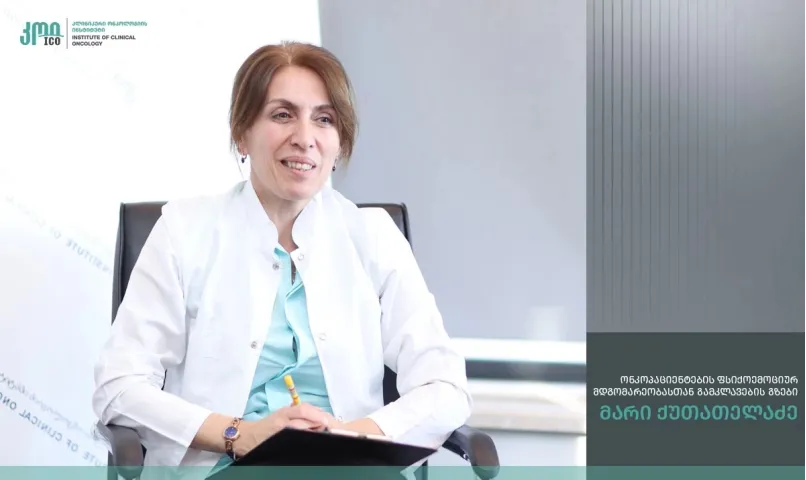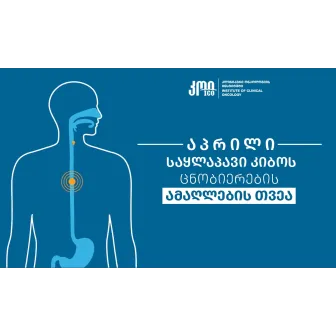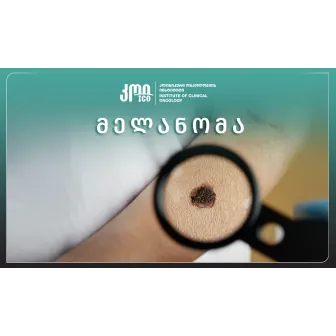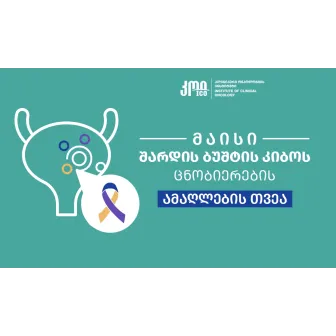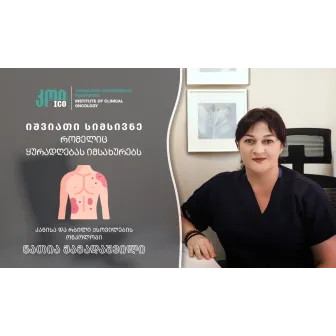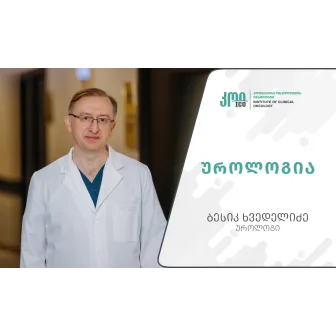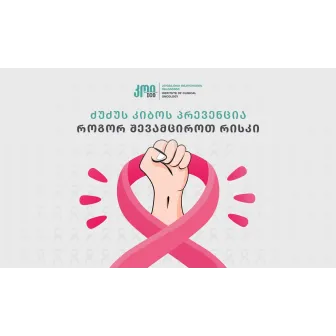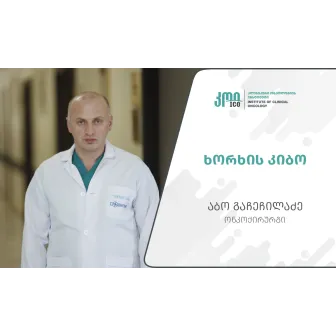The psycho-emotional state of cancer patient and therapeutic mechanisms for coping with it.
Psychological state of cancer patients.
An oncologist is the first person, the patient directly communicates with and establishes a trust-based relationship. It is important to give the patient accurate information about her/his health status so that the patient can quickly and adequately adapt to the diagnosis.
Cancer diagnosis awakes in a person a fear of a safe life, while at the same time losing control over the situation, the disease, and treatment. In general, life is perceived as uncertain and pessimistic. From the perspective of clinical psychology, this situation can be described as a crisis. It may be the threshold of the oncologic experience creating the risk of post-traumatic stress disorder, which is often manifested in people with a cancer diagnosis.
It can have the following manifestations:
- Recurring dreams about disease-related events; any pain or sensations incomprehensible to the patient causing psychosomatic symptoms, which the patient associates with a disease relapse of or the manifestation of metastasis.
- A person fails to talk about the diagnosis, starts crying when meeting with an oncologist, wants to forget everything, tries to get isolated from other people, and has difficulty seeing perspectives of life.
- A person has trouble falling asleep, easily gets angry and is irritated, has trouble with concentration, and has increased anxiety.
Depending on physical and emotional status, people with cancer diagnosis require both physical and psychoemotional care. The main task of an oncologist is to demonstrate empathy. Empathy is the ability to imagine oneself in another person’s place and accept this person as it is, without assessing (like or don’t like). Empathy helps the doctor to evaluate not only the physical but also the internal status of the patient which can be expressed both verbally and non-verbally.
Consideration of emotional safety is also important. Information about the diagnosis should be provided either directly to the patient alone or in the presence of a third person only with the patient's permission.
Telling the diagnosis involves giving the information about the diagnoses and all stages of treatment. Lack of information exacerbates the perception of the disease that can lead to psychosomatic exacerbation of the disease. The observation shows that all people give the doctor a great role in treatment. Discussing the patient's health condition with her/him, explaining the need and importance of examinations, and planning treatment are perceived by the patient as her/his participation and involvement in this process that makes the patient more motivated and responsible in the process of the treatment process, the patient feels power and importance in solving his vital problems, taking the responsibility for own health.
Psychological methods of care for cancer patients
The goal of psychological support to provide emotional, semantic, and existential support to a patient and his/her family members in a crisis caused by cancer diagnosis.
The support aims to help the patient accept the disease, adapt to it, and develop an appropriate behavioral model. Thus, psychological support aims to improve the patient's quality of life.
Fear of pain, changing one's appearance, and losing one's social role are causes of psychological trauma for any person.
Every person’s reaction to a stressful situation is individual, depending on age, gender, personal characteristics, social status, as well as psychological defense mechanisms. If, after completing treatment, the patient's emotional state prevents him from physical and social activity and affects his quality of life, there is a clear indication that the person requires psychological support, and the involvement of a psychiatrist may also be necessary.
Several stages of psychological support are singled out - diagnostics, placement to a clinic, pre-surgery, post-surgery, discharge, and post-treatment stages. The goals, tasks, and working modalities of psychological support are different.
During psychological work, a complex approach is used, such as psychological diagnosis, psychological counseling, psychological correction (both individual and group), and psychological support for the patient's relatives. (Family counseling).
Stage of diagnostics: Is one of the most important stages in terms of the expression of reaction, when the further dynamics can be defined. It’s the first moment when the patient has to face a cancer diagnosis and needs to agree with the doctor to undergo diagnostic tests and treatment. At this stage, most patients have anxiety and a depressed mood. In order for this condition not to develop into further chronic psychological distress, it is necessary to work with the person using persuasion methods. When using this method, a medial psychologit needs thorough knowledge of cancer diseases, treatment methods, and also coordinated work with the patient's oncologist. After the patient starts treatment, the first shock reaction gradually reduces and emotional reactions, such as alternating positive and negative emotions begin – starting the treatment, the attention of medical personnel, and the stories of other recovered cancer patients create positive emotions, while the negative outcomes of patients with cancer diagnosis create negative emotions. Such alteration leads to cognitive changes, problems in attention concentration skills, changes in perception, motor functions, and insomnia. The psychological work, started during the period of diagnostics is continued to manage emotional and anxiety background. The method such as art therapy, which is a creative process, is used for the correction of depressive state and helps an individual in expressing emotions, changing attitudes, and self-acceptance.
Pre-surgery period: This period is characterized by increased anxiety, which is considered normal in this situation. It is natural to fear anesthesia and pain. The psychologist's task at this time is to help the patient overcome this fear.
Post-surgery period: During this period, preoperative emotions reduce, and asthenic-depressive and anxious-hypochondriacal moods appear; the patient starts thinking about postoperative complications, physical fatigue in the postoperative period, and the waiting for histomorphology and the period of further treatment. At this time, it's the psychologist's obligation to prepare the patient for further treatment.
Stage of discharge from the clinic: At this time, no special psychological states are manifested. In some cases, the patients demonstrate anxiety and fear of being left at home without the doctor’s supervision. At this stage, it is important to prepare the patient's family members to avoid social isolation of the patient. Therefore, it is the psychologist's responsibility to help family members overcome anxiety and fear, which are sometimes more clearly manifested in them, negatively affecting the patient. At this point, it is important to have adequate support from close people, which means being close to the patient and helping to observe the doctor's recommendations.
Post-treatment process: After the completion of a long-term and tiresome treatment, the patient needs to go for follow-up examinations and permanently is in a state of anxiety. The fear of the disease recurrence leads to chronic distress; being physically healthy, the person may constantly suffer from the thought of further continuation of life. The loss of social role associated with the treatment period, changes in body image, and adaptation to a new lifestyle lead to increased anxiety, which negatively affects the quality of life. Such a state is manifested by insomnia, depressed mood, irritability, impaired concentration, increased or decreased appetite, social isolation, self-doubt, despair, and aggressive behavior. These are the problems that the therapeutic group (structured or semi-structured closed therapeutic group) helps individuals overcome through group meetings, following a planned schedule. The number of such group meetings is determined and primarily focused on achieving therapeutic effect. The key component of such a group is emotional support. It also ensures the delivery of information and knowledge, sharing of coping skills and acceptance, and reduces social isolation.
Expected Results: Enhanced self-confidence, acceptance of disease, a sense of control, taking responsibility for own health, development of more effective communication skills, and development of effective mechanism for coping with multiple treatment-related challenges.
- Views:4002




